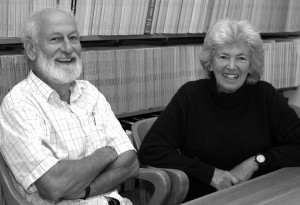Peter and Rosemary Grant received honorary degrees for their achievements in evolutionary biology in front of Ohio Wesleyan students, faculty and community members on Wednesday, April 18 in the Benes Rooms.
The Grants are British evolutionary biologists and professors emeriti at Princeton University.
They are most known for their work on Darwin’s finches on the Galápagos Island Daphne Major.
Since 1973, the Grants have spent six months of each year capturing, tagging and taking blood samples of the birds.
President Rock Jones welcomed and introduced the Grants and explained what an honorary degree involves.
“We are privileged and honored to have Peter and Rosemary Grant here with us at Ohio Wesleyan,” Jones said.
“On rare occasions the university bestows an honorary degree. This requires the whole faculty to be in agreement, and it is given to those who demonstrate the examples of scholarship and service that we want for our students.”
Jones said the Grants are leaders in evolutionary biology and their study of the finches in the Galápagos is a tribute to Charles Darwin.
He said that in light of their research and commitment to the scientific community, they will receive degrees titled Doctor of Science.
“In recognition of their service to the scientific community and their commitment to show how evolution works in real time, we bestow upon them the degree: Doctor of Science,” Jones said.
Upon the presentation of their degrees in traditional commencement regalia, the Grants received a standing ovation from the crowd.
Jed Burtt, professor of zoology, introduced the Grants before they presented their lecture in correspondence with the Clark Ornithological Lecture Series.
Burtt nominated the Grants after hearing them speak at Ornithology meetings.
“I’ve known them (the Grants) for a while, and I really wanted to bring them to Ohio Wesleyan, so finally having them here is the end of a lot of work,” Burtt said.
“I’ve published on the Galápagos, too, so it’s neat for me to have them here and spend time with them learning about their research. I think that honorary degrees are a great thing because they expand on what we have here.”
Peter Grant first spoke about their research and showed a video to give an idea of how they did their research on the island of Daphne Major.
Rosemary Grant then finished the lecture by elaborating on their findings and explaining what is next in their research.
She closed by thanking everyone for the honorary degrees.
“On behalf of Peter and I, I would like to thank everyone for the honor you have given us to make us an honorary part of your community,” she said.
The Grants received a second standing ovation following the lecture. Afterwards there was a reception at which the Grants autographed the lecture pamphlets and other pieces of their work.
Peter Grant said receiving the degrees was an unexpected “terrific honor”.
“When one does research biology you only hope that your research ends well,” he said. “When you do receive an award, you can’t help but thank everyone who helped to make the research possible, everyone who provided funding, and of course, lady luck.”
Peter was made a Fellow of the Royal Society in 1987; Rosemary followed in 2007. In 2008 both were among the thirteen recipients of the Darwin-Wallace Medal, presented every 50 years by the Linnean Society of London.
In 2009, they won the annual Kyoto Prize in basic sciences, an international award honoring significant contributions to the scientific, cultural and spiritual betterment of mankind.